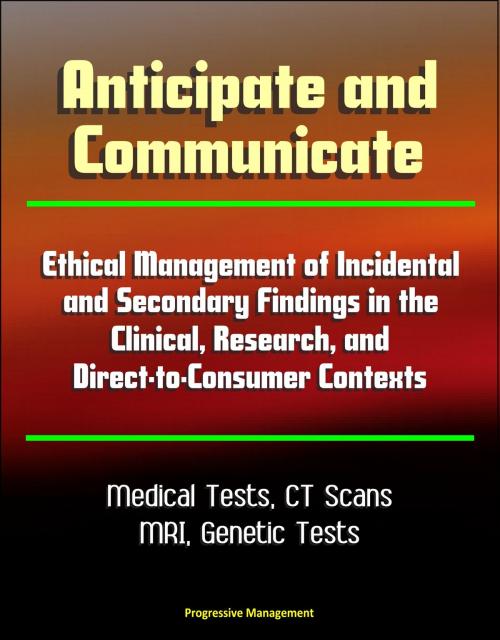Anticipate and Communicate: Ethical Management of Incidental and Secondary Findings in the Clinical, Research, and Direct-to-Consumer Contexts - Medical Tests, CT Scans, MRI
Nonfiction, Health & Well Being, Medical, Specialties, Clinical Medicine| Author: | Progressive Management | ISBN: | 9781310663208 |
| Publisher: | Progressive Management | Publication: | January 14, 2014 |
| Imprint: | Smashwords Edition | Language: | English |
| Author: | Progressive Management |
| ISBN: | 9781310663208 |
| Publisher: | Progressive Management |
| Publication: | January 14, 2014 |
| Imprint: | Smashwords Edition |
| Language: | English |
This report, released in December 2013 by the Presidential Commission for the Study of Bioethical Issues, focuses on the distinct ethical issues concerning the management of incidental and secondary findings that arise from clinical, research, and direct-to-consumer testing. Incidental findings traditionally are defined as results that arise that are outside the original purpose for which a diagnostic test or procedure was conducted. Such findings can be lifesaving, but also can lead to uncertainty and distress if they are unexpected or identify conditions for which no effective treatment is available.
EXECUTIVE SUMMARY * ETHICAL BASIS OF THE MANAGEMENT OF INCIDENTAL AND SECONDARY FINDINGS * RECOMMENDATIONS * Overarching Recommendations * Informing Persons Tested * Evidence-Based Practice Guidelines * Additional Empirical Research * Educating Stakeholders * Justice and Fairness and Health Inequities * Context-Specific Recommendations * Clinical Recommendations * Research Recommendations * Direct-to-Consumer Recommendations * Conclusion * CHAPTER 1: Introduction * Past Consideration of the Management of Incidental and Secondary Findings * Taxonomy of Incidental Findings * Ethical Basis of the Management of Incidental and Secondary Findings * The Bioethics Commission's Process * About this Report * CHAPTER 2: Modalities and Probable Incidental and Secondary Findings * Large-Scale Genetic Sequencing * Testing of Biological Specimens * Imaging * Conclusion * CHAPTER 3: Overarching Recommendations for Incidental and Secondary Findings * Informing Persons Tested * Evidence-Based Practice Guidelines * Additional Empirical Research * Educating Stakeholders * Justice and Fairness and Health Inequities * CHAPTER 4: Ethical Management of Incidental and Secondary Findings in the Clinical Context * Practical Considerations of Incidental and Secondary Findings * in the Clinical Context * Legal Considerations of Incidental and Secondary Findings in the Clinical Context * Ethical Considerations of Incidental and Secondary Findings in the Clinical Context * Respect for Persons * Beneficence * Justice and Fairness * Analysis and Recommendations * Consent in the Clinical Context * Empirical Data in the Clinical Context * Clinical Judgment in Managing Incidental and Secondary Findings * Conclusion * CHAPTER 5: Ethical Management of Incidental and Secondary Findings in the Research Context * Practical Considerations of Incidental and Secondary Findings in the Research Context * Legal Considerations of Incidental and Secondary Findings in the Research Context * Ethical Considerations of Incidental and Secondary Findings in the Research Context * Respect for Persons * Beneficence * Justice and Fairness * Intellectual Freedom and Responsibility * Analysis and Recommendations * Consent in the Research Context * Planning for Incidental Findings in Research * No Duty to Look for Secondary Findings in Research * Conclusion * CHAPTER 6: Ethical Management of Incidental and Secondary Findings in the Direct-to-Consumer Context * Practical Considerations of Incidental and Secondary Findings in the Direct-to-Consumer Context * Legal Considerations of Incidental and Secondary Findings in the Direct-to-Consumer Context * Ethical Considerations of Incidental and Secondary Findings in the Direct-to-Consumer Context * Respect for Persons * Beneficence * Justice and Fairness * Intellectual Freedom and Responsibility * Analysis and Recommendations * Consent in the Direct-to-Consumer Context * Government Regulation in the Direct-to-Consumer Context * Industry-Wide Best Practices in the Direct-to-Consumer Context * Conclusion * CHAPTER 7: Conclusion * ENDNOTES
This report, released in December 2013 by the Presidential Commission for the Study of Bioethical Issues, focuses on the distinct ethical issues concerning the management of incidental and secondary findings that arise from clinical, research, and direct-to-consumer testing. Incidental findings traditionally are defined as results that arise that are outside the original purpose for which a diagnostic test or procedure was conducted. Such findings can be lifesaving, but also can lead to uncertainty and distress if they are unexpected or identify conditions for which no effective treatment is available.
EXECUTIVE SUMMARY * ETHICAL BASIS OF THE MANAGEMENT OF INCIDENTAL AND SECONDARY FINDINGS * RECOMMENDATIONS * Overarching Recommendations * Informing Persons Tested * Evidence-Based Practice Guidelines * Additional Empirical Research * Educating Stakeholders * Justice and Fairness and Health Inequities * Context-Specific Recommendations * Clinical Recommendations * Research Recommendations * Direct-to-Consumer Recommendations * Conclusion * CHAPTER 1: Introduction * Past Consideration of the Management of Incidental and Secondary Findings * Taxonomy of Incidental Findings * Ethical Basis of the Management of Incidental and Secondary Findings * The Bioethics Commission's Process * About this Report * CHAPTER 2: Modalities and Probable Incidental and Secondary Findings * Large-Scale Genetic Sequencing * Testing of Biological Specimens * Imaging * Conclusion * CHAPTER 3: Overarching Recommendations for Incidental and Secondary Findings * Informing Persons Tested * Evidence-Based Practice Guidelines * Additional Empirical Research * Educating Stakeholders * Justice and Fairness and Health Inequities * CHAPTER 4: Ethical Management of Incidental and Secondary Findings in the Clinical Context * Practical Considerations of Incidental and Secondary Findings * in the Clinical Context * Legal Considerations of Incidental and Secondary Findings in the Clinical Context * Ethical Considerations of Incidental and Secondary Findings in the Clinical Context * Respect for Persons * Beneficence * Justice and Fairness * Analysis and Recommendations * Consent in the Clinical Context * Empirical Data in the Clinical Context * Clinical Judgment in Managing Incidental and Secondary Findings * Conclusion * CHAPTER 5: Ethical Management of Incidental and Secondary Findings in the Research Context * Practical Considerations of Incidental and Secondary Findings in the Research Context * Legal Considerations of Incidental and Secondary Findings in the Research Context * Ethical Considerations of Incidental and Secondary Findings in the Research Context * Respect for Persons * Beneficence * Justice and Fairness * Intellectual Freedom and Responsibility * Analysis and Recommendations * Consent in the Research Context * Planning for Incidental Findings in Research * No Duty to Look for Secondary Findings in Research * Conclusion * CHAPTER 6: Ethical Management of Incidental and Secondary Findings in the Direct-to-Consumer Context * Practical Considerations of Incidental and Secondary Findings in the Direct-to-Consumer Context * Legal Considerations of Incidental and Secondary Findings in the Direct-to-Consumer Context * Ethical Considerations of Incidental and Secondary Findings in the Direct-to-Consumer Context * Respect for Persons * Beneficence * Justice and Fairness * Intellectual Freedom and Responsibility * Analysis and Recommendations * Consent in the Direct-to-Consumer Context * Government Regulation in the Direct-to-Consumer Context * Industry-Wide Best Practices in the Direct-to-Consumer Context * Conclusion * CHAPTER 7: Conclusion * ENDNOTES















